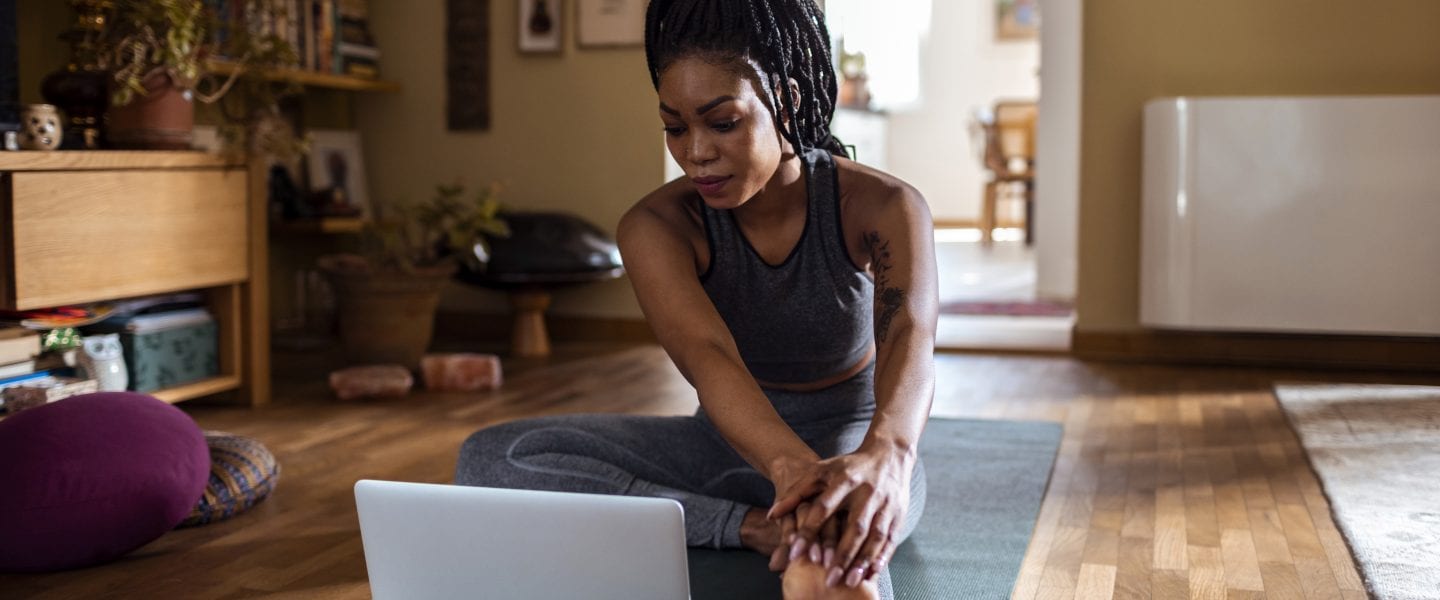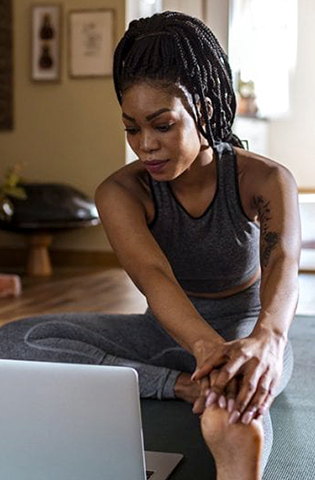Discover five simple changes that can create a healthier future and tell us which one you’re most likely to try.


Improving your health doesn’t mean you have to move mountains. In fact, it could be as easy as changing your table settings. (Literally!)
We asked Dr. Jamie Melichar, an HCA Healthcare-affiliated primary care physician in the West Florida Division, for advice on easy ways to make healthy choices a habit. She delivered with five ideas you may not have considered. They may seem minor, but their long-term effects can make a huge difference.
Small change No. 1: Take a break from the news.
The fight against the deadly coronavirus outbreak has left Americans in a state of uncertainty. Changes to daily routines—not to mention the fear that you or your loved ones might get sick—can leave you feeling stressed, depressed, anxious and isolated. And, if you’re among those on the front lines of the battle in emergency rooms and intensive care units, these feelings may be magnified.
“I think in a time of unrest, when many of us are trying to adjust to this new normal, it’s important to find your peace—whatever it may be,” says Dr. Melichar.
She encourages her patients to put down their electronics, turn off the news and just find happiness in the simple things. Whether it’s while you’re at home or after your shift at work, be sure to take a few quiet moments for yourself. Enjoy a sit-down meal with your family, read a book, meditate, go for a walk, or call a friend or family member. Taking your mind off the situation—even for a little while—can go a long way in helping you cope.
“I very much encourage people to take this seriously and practice social distancing,” says Dr. Melichar. “But at the same time, don’t let it encompass every moment of every day.”
Plus, if you’re anxious, stressed or depressed, it can be that much harder to focus on other aspects of your health, like good diet and exercise habits.
“Our emotional state affects everything we do: how we treat others, how we treat ourselves, how we perform at work,” says Dr. Melichar. “Improving your mental well-being can have a big impact on your success in all the things you’re trying to accomplish.”
Small change No. 2: Keep a food journal.
If you think your diet could be healthier (and whose couldn’t?), Dr. Melichar says the best place to start changing it is with self-evaluation.
“I try to encourage people to evaluate their own diet and think about, ‘What do I eat, what are the things that I do well on and where are my downfalls?’” she says. “And then, individually, try to find a goal for themselves.”
Start by keeping a food journal for a week. Write down everything you eat and drink, and then research the calories and nutritional value of the foods you consume the most—your staple foods. (Pro tip: An app like MyFitnessPal makes it easy.) Armed with that information, you can set reachable goals for yourself.
“For example, if you find you’re eating red meat more than twice a week,” says Dr. Melichar, “your goal could be to reduce that by one serving a week.”
Small change No. 3: Use salad plates.
Another simple way to start eating healthier: Get your portions under control.
Dr. Melichar says, “Restaurant portions are usually two to three times what you’re supposed to get. But it’s on a plate in front of you, and your brain thinks, ‘You have to eat that.’”
With social distancing guidelines in place and so many of us cooking at home, it’s a good opportunity to downsize. Dr. Melichar’s recommendation? Swap out your full-size dinner plates for smaller salad plates at mealtime.
“They hold less food and, therefore, fewer calories,” she says. “But since your brain sees you cleaning your plate, you’re likely to still feel satisfied with the smaller portion.”
It works if you’re ordering takeout, too. Instead of getting a full entrée, just order one and split it with someone. Then, serve each portion on the smaller plates.
Small change No. 4: Replace one soft drink a day with water.
The total amount of fluids you should take in each day varies depending on your age, sex and other health factors. But no matter how you measure it, it’s always a good idea to have the majority of your fluid intake come from plain water—rather than sugar-sweetened drinks.
A good place to start: Try replacing one soda a day with water. If you’re missing the taste of your favorite sweetened drink, Dr. Melichar recommends cutting up slices of fruit to put in your water. Or if it’s the carbonation you miss, try adding seltzer or tonic water.
“You will adapt over time,” she says. “Your palate will change.”
Increasing your water intake can also help battle the effects of dehydration, which can include headaches, dry skin, body aches and fatigue.
Small change No. 5: Trade one TV show for exercise.
According to the Centers for Disease Control and Prevention, adults should get at least 150 minutes of moderate-intensity aerobic activity every week—or about 30 minutes a day, five days a week. If you’re already physically active, that may not sound too tough. But if you haven’t been exercising at all, it can be a high hill to climb.
“I try to talk to people about little goals and working up to things,” says Dr. Melichar. “Go for a walk twice a day for 10 or 15 minutes. Or, think about the TV shows you watch: Can you give up one half-hour show each night and get up and move instead?”
Dr. Melichar also encourages her patients to keep challenging themselves. Start with a walk, and when that becomes easy, work up to a speed walk and eventually to a jog. Or, if you’re on your feet all day at work, consider yoga or simple stretching exercises you can do at a desk to relieve tired muscles. “Exercise can improve your overall well-being and mental health, as well as your cardiovascular fitness,” she says.
There are plenty of ways to stay active indoors, too. Search YouTube or streaming services such as Amazon Prime for workout videos—many of them are free. You can also get at-home workout ideas from trainers or media outlets like Women’s Health magazine when you follow them on social media. Or, go old-school and pull out those exercise DVDs you never got rid of. The most important thing is to find something you enjoy.
“Dance in your living room, if you want,” says Dr. Melichar. “As long as you’re getting your heart rate up, it’s a good workout.”
Quiz only available online
https://www.riddle.com/showcase/241413/poll
Featured Colleague
Jamie Melichar, D.O., is a board-certified family medicine provider at Aspire Medical Group in her hometown of New Port Richey, Fla. She joined the practice in 2019 because she wanted to give back to the community she loves. Dr. Melichar’s patients appreciate her open and thorough communication, allowing for a better understanding of their health.


